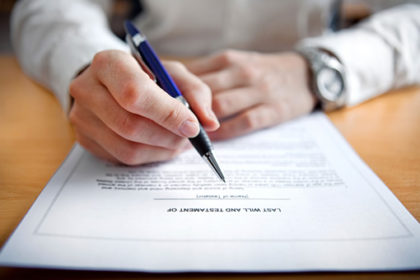
Plan for the Future – Enduring Power of Attorney
If we had a crystal ball and could see in to the future wouldn’t it be wonderful – we could plan and manage our businesses and personal affairs accordingly. Unfortunately none of us can predict what is around the corner and so the importance of having the right person in the wings with the legal authority to act on your behalf, if you are not in a position to do so yourself, cannot not be underestimated.
How does an Enduring Power of Attorney ( EPA for short) work ?
If someone becomes incapacitated through disability, illness or a progressive degenerative disease their assets could potentially be frozen. To avoid this situation a person, while in good health, should create an Enduring Power of Attorney (EPA), sometimes known as a “living will”. The Power of Attorney only takes effect when a person becomes mentally incapacitated. In the event of the Donors incapacity to deal with his/her money and assets the Power of Attorney transfers authority to look after the money and assets to the Attorney, once certain steps are taken. The Donor is not prevented from dealing with his/her money and assets by creating the EPA, this only happens if the Donor becomes mentally incapacitated.
Waht Powers does an Attorney have ?
An Enduring Power of Attorney can be very specific such as giving the Attorney a particular task to carry out, e.g. the sale of property or management of bank accounts. Alternatively the EPA could be very general and virtually entitle the Attorney to do everything that you would do yourself, with your money and property. This second type of EPA could also enable your Attorney to make “personal care” decisions e.g. where a person lives, whom s/he should see and not see, diet and dress. If you want to impose certain restrictions on the Attorney you can do so, for example prohibiting the sale of your house.
Who do you Appoint as Attorney?
You can appoint anyone you wish to act as your Attorney – your spouse, a family member or a friend. You can also appoint more than one person. You can specify that they must act together – decisions must be made jointly or alternatively it can be specified that they act jointly and severally where they can act together but decisions can also be made by one or other. The choice of Attorney is a personal matter but a good deal of thought needs to be given to the nomination. You need to ask yourself is this person suitable for the job? Are they trustworthy and do they have the skills to manage my affairs and make decisions for me? If you have made a decision to appoint one family member you can specify others that have to be consulted about what would be best for you and what your wished might have been had you been able to make decisions. You can also select an alternative Attorney in case your first choice is unwilling or unable to act.
Waht is the Procedure for creating an EPA?
The procedure for the creation of an EPA is complex. You will have to consult your Solicitor and your Doctor. Your Solicitor will prepare the documentation for you after consultation with you and deciding whether a specific or general Power of Attorney is more suited to your needs. Your Attorney will need to be advised about their role and duties, and two independent people must be notified that you have created the Power of Attorney. Your Solicitor will prepare all of this paperwork and notices and guide you through the process.
Can you Change your mind?
The EPA can be revoked at any time before it is registered, provided that the person that created the power still has the mental capacity to do so. If you change your mind about having an EPA or about your choice of Attorney you should consult your Solicitor immediately. Your Solicitor will advise on the process of revocation of the EPA.
Registration of the EPA – what happens if or when I lose capacity?
The Attorney must apply to the Wards of Court office for registration of the EPA if the Donor becomes mentally incapacitated and it is only after it is registered that it comes in to effect. The Attorney will have to produce medical evidence of the Donor’s incapacity and notice of the application to register the EPA must also be served on the person that created the Power and the same two persons that were notified of the creation of the EPA. This series of notifications and checks involved in the registration makes sure that the system is open and transparent and allows people to object if they are concerned that the Attorney might be acting inappropriately. Once the EPA is registered the Attorney can lawfully act on the Donor’s behalf. If there are urgent decisions required e.g. in the area of personal care the Attorney can make decisions before the EPA is registered and likewise if they need to take any action to preserve and protect the Donors assets, they can do so before the EPA is registered. The Attorney has a duty to keep accounts and produce them to the Wards of Court office if required. The Attorney can only claim out-of-pocket expenses unless the Donor has specified that s/he is entitled to be paid.
An Enduring Power of Attorney is as important as your Will, but many people place more emphasis on the latter. The Enduring Power of Attorney will prevent a situation arising where money assets become frozen as friends and family members struggle to cope with the stresses and demands that illness will foist upon them.

